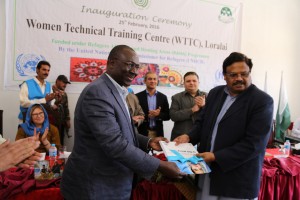Press Release
25 February, 2016
QUETTA: UNHCR’s Assistant High Commissioner Mr. George Okoth-Obbo stressed the need for concerted efforts by all stakeholders to empower youth through education and skills development as an essential element of stability and sustainable development.
“Investing in Pakistani and Afghan youth equals to investment in resilience, stability and future prosperity of both countries,” he said while speaking at the inauguration ceremony of the Women Technical Training Centre in Loralai district in Balochistan. Mr. George Okoth-Obbo visited Quetta and Loralai on the outset of his three-day mission to Pakistan.

UNHCR’s Assistant High Commissioner Mr. George Okoth-Obbo presenting handover documents to Hamid ul Karim, Secretary Labour and Manpower at the inauguration ceremony of the Women Technical Training Centre in Loralai district in Balochistan on Thursdsay. (c) UNHCR/Q.K.Afridi
Owing to the joint efforts of the provincial Government of Balochistan, UNHCR and the international community under the Refugee Affected and Hosting Areas (RAHA) initiative, the northern Balochistan region will soon open its first-ever technical training centre for women, fully compliant with international standards. The aim of this milestone project, worth USD 1.2 million, is to enhance vocational skills and increase livelihood opportunities for women from both the Afghan refugee and their Pakistani host communities living in Loralai district and generally in Zhob division.
The RAHA initiative is aimed at supporting refugee hosting communities by provision of enhanced access to quality services in the sectors of education, health, water and sanitation, and livelihoods across the country.
Mr. George Okoth-Obbo said that RAHA recognizes Pakistan’s longstanding hospitality towards refugees, and encouraged the international community to continue providing reinvigorated support to this initiative as a tangible demonstration of international solidarity and responsibility-sharing with the people of Pakistan for hosting the world’s largest protracted refugee population for more than 35 years.
The Zhob division comprised of six districts was lacking a Technical and Vocational Education Training institute for women. The Loralai centre will now provide this much needed access to employable skills training for women, in line with national and international standards.
Under the project around 260 individuals will be trained per year in certified G-III courses. The training courses will be taught under the competency based training (CBT) curricula developed by the National Vocational and Technical Training Commission (NAVTTC) and recognized internationally.
The regular courses operated by the Labour department for all training institutes in the province are G-III courses. The target group of the training centre will consist of the female youth of Zhob division who have passed a specific education level. The Pakistan and Afghan graduates of the centre will join the local labour market as skilled workforce and will play a vital role in the development and economies of Pakistan and Afghanistan.
Based on the skills demand survey for the local market and corresponding list of skills demand in Afghanistan, four trades shall be taught in WTTC facility, including computer operating, tailoring/dress designing, beautician services, and food processing.
Speaking at the occasion, UNHCR’s Representative in Pakistan Mr. Indrika Ratwatte noted that such mega projects are vital for building the human capital of the future generations of Afghanistan and Pakistan, and as such exemplify the efforts of the Government of Pakistan to meet its commitment to achieve the Sustainable Development Goals by 2030.
He said since its start in 2009, some 3,500 RAHA projects have been implemented across Pakistan in the sectors of health, education, infrastructure, livelihoods, water and sanitation. Some 10.6 million people have benefited from RAHA projects, of which, 11 per cent are Afghan refugees whilst 89 per cent have been Pakistani citizens in refugee hosting areas.
Chief Commissioner Afghan Refugees Dr.Imran Zeb appreciated the initiative and said that similar projects have vital impact on the well-being, peaceful co-existence and social cohesion within communities
Obaidullah Jan Babat, special adviser to the Chief Minister said he personally remained involved in the implementation of the project from the day first, adding such projects should be implemented to enable youth to acquire skills.
Secretary Labour and Manpower Hamid ul Karim in his concluding remarks said UNHCR and the international community deserved appreciation for implementing such projects. “The government of Balochistan stands committed to the welfare of the people specially women,” he said and added in order to materialize the project, the government of Balochistan provided free of cost land, staff deputed and posts were created as a special case. Earlier, the Commissioner of Zhob Division Fawad Hashim Rabbani welcomed the guests.
Balochistan hosts around 300,000 registered Afghan refugees, the majority of whom live in urban settlements alongside their Pakistani hosts. The RAHA initiative in Pakistan seeks to ensure that not only Afghan refugees but also their host communities can benefit through the improvement of key facilities. Under the RAHA initiative, UNHCR and Commissionerate for Afghan Refugees in Balochistan have, so far, implemented nearly 230 projects worth USD 20.3 million in nine districts, benefitting 3.4 million people.
The RAHA programme is a major component of the regional Solutions Strategy for Afghan Refugees (SSAR) developed by Afghanistan, Iran, and Pakistan and UNHCR; and endorsed by the international community in May 2012. The SSAR provides a predictable roadmap for joint interventions aimed at facilitating voluntary return and sustainable reintegration of Afghan refugees in Afghanistan, while simultaneously providing assistance to refugee hosting communities.
The ceremony was also attended by Ms. Daisy Dell, UNHCR Regional Director for Asia and Pacific Bureau (RBAP), Mr. Johann Siffointe, Deputy Representative, and Head of UNHCR Sub-Office Quetta, Dinesh Lal Shrestha, Obaidullah Jan Babat, special adviser to the Chief Minister and MPA from Loralai, women MPAs, refugee elders and representative from civil society.
Share on Facebook Share on Twitter